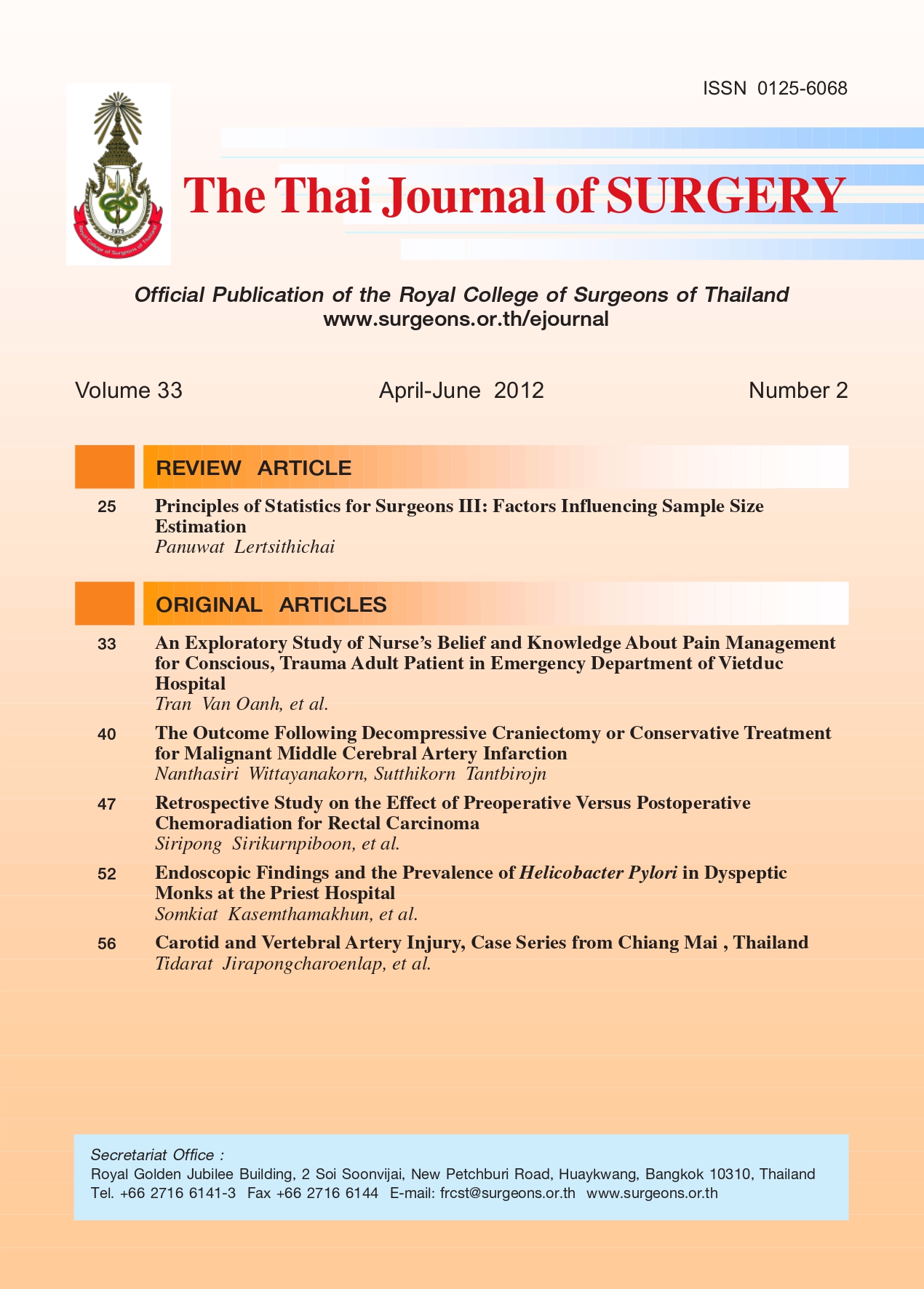The Outcome Following Decompressive Craniectomy or Conservative Treatment for Malignant Middle Cerebral Artery Infarction
Keywords:
malignant MCA infarction, decompressive craniectomy, decompressive surgery in elderlyAbstract
Background: At present, malignant middle cerebral artery (MCA) infarction has a high morbidity andmortality rate worldwide. The aims of this study were to identify the mortality rate, to determine the value of
decompressive craniectomy in patients who were presented with malignant middle cerebral artery (MCA)
infarction, to compare functional outcome in elderly patients with younger patients and identify significant risk
factors related to the mortality.
Method: Medical records of patients with malignant middle cerebral artery (MCA) infarction treated in
Bhumibol Adulyadej Hospital between January 2008 and April 2011 were reviewed. A total of 82 patients with
complete medical records and radiographic imagines were included in this study. The area of infarction was
determined by the ABC/2 method and the degree of herniation was determined with Ambient cistern
effacement and shift of the midline. The Glasgow Coma Scale score was assessed for neurologic status at
admission, at operative time (in surgery group), and at one-week time after infarction. All patients were assessed
with the modified Rankin Scale (RS) at discharge and at 3 months after infarction.
Results: The mortality rate of patients with malignant middle cerebral artery (MCA) infarction at
discharge was 45% and 3 months after infarction was 48.8%. At discharge, there was a significant difference in
the mortality of patients with malignant middle cerebral artery (MCA) infarction in conservative group and
surgery group [(17/50 (34%) versus 20/32 (62.5%)), p = 0 .011]. Also at 3 months after infarction, there was a
significant difference in mortality in the conservative group and the surgery group [(19/50 (38.0%) versus 21/
32 (65.6%)), p = 0.015]. There was a significant high mortality rate in the surgery group with age≤ 60 years.
Dyslipidemia and ischemic heart disease were risk factors of malignant middle cerebral artery (MCA infarction
related death with an odd ratio 1.419 (95%CI 0.504-4.00) and 2.00 (95%CI 0.345-11.578) respectively.
Conclusion: The mortality rate of patients with malignant middle cerebral artery (MCA) infraction treated
at our hospital was nearly 50% and the rest of the patients were dependent. There was a significant high
mortality rate in the surgery group with age≤ 60 years which could be explained by the severity of thedisease.
In addition, the more underlying diseases, the higher the mortality rate will be.
References
outcome following decompressive craniectomy for
malignant middle cerebral artery infarction in patients older
than 60 years of age. Neurosurg Focus 2009;26(6):E3. Review.
2. Hofmeijer J, Kappelle LJ, Algra A, Amelink GJ, van Gijn J, van
der Worp HB; HAMLET investigators. Surgical decompression
for space-occupying cerebral infarction (the Hemicraniectomy
after middle cerebral artery infarction with lifethreatening
edema trial [HAMLET]): a multicentre, open,
randomised trial. Lancet Neurol 2009;8(4):326-33. Epub
2009 Mar 5.
3. Vahedi K, Vicaut E, Mateo J, Kurtz A, Orabi M, Guichard JP,
et al. DECIMAL Investigators. Sequential-design, multicenter,
randomized, controlled trial of early decompressive
craniectomy in malignant middle cerebral artery infarction
(DECIMAL Trial). Stroke 2007;38(9):2506-17. Epub 2007 Aug 9.
4. Yao Y, Liu W, Yang X, Hu W, Li G. Is decompressive
craniectomy for malignant middle cerebral artery territory
infarction of any benefit for elderly patients? Surg Neurol
2005;64(2):165-9; discussion 169.
5. Robertson SC, Lennarson P, Hasan DM, Traynelis VC. Clinical
course and surgical management of massive cerebral
infarction. Neurosurgery 2004;55(1):55-61; discussion 61-2.
6. Jüttler E, Schwab S, Schmiedek P, Unterberg A, Hennerici M,
Woitzik J; DESTINY Study Group. Decompressive Surgery for
the Treatment of Malignant Infarction of the Middle Cerebral
Artery (DESTINY): a randomized, controlled trial. Stroke
2007;38(9):2518-25. Epub 2007 Aug 9.
7. Lanzino DJ, Lanzino G. Decompressive craniectomy for
space-occupying supratentorial infarction: rationale,
indications, and outcome. Neurosurg Focus 2000 May
15;8(5):e3. Review.
8. Pedraza S, Puig J, Blasco G, Daunis-i-Estadella J, Boada I,
Bardera A, et al. Reliability of the ABC/2 method in
determining acute infarct volume. J Neuroimaging
2011;XX:1-5 DOI: 10.1111/j.1552-6569.2011.00588.x
9. Guidelines for the Early Management of Adults With Ischemic
Stroke: A Guideline From the American Heart Association/
American Stroke Association Stroke Council, Clinical
Cardiology Council, Cardiovascular Radiology and
Intervention Council, and the Atherosclerotic Peripheral
Vascular Disease and Quality of Care Outcomes in Research
Interdisciplinary Working Groups: The American Academy
of Neurology affirms the value of this guideline as an
educational tool for neurologists Harold P. Adams Jr, Gregory
del Zoppo, Mark J. Alberts, Deepak L. Bhatt, Lawrence Brass,
Anthony Furlan, Robert L. Grubb, Randall T. Higashida,
Edward C. Jauch, Chelsea Kidwell, Patrick D. Lyden, Lewis B.
Morgenstern, Adnan I. Qureshi, Robert, H. Rosenwasser,
Phillip A. Scott and Eelco F.M. Wijdicks Stroke 2007;38;1655-
711; originally published online Apr 12, 2007; DOI: 10.1161/
STROKEAHA.107.181486.
10. Pillai A, Menon SK, Kumar S, Rajeev K, Kumar A, Panikar
D.Decompressive hemicraniectomy in malignant middle
cerebral artery infarction: an analysis of long-term outcome
and factors in patient selection. J Neurosurg 2007;106(1):59-
65
Downloads
Published
How to Cite
Issue
Section
License
Articles must be contributed solely to The Thai Journal of Surgery and when published become the property of the Royal College of Surgeons of Thailand. The Royal College of Surgeons of Thailand reserves copyright on all published materials and such materials may not be reproduced in any form without the written permission.



